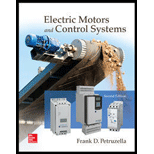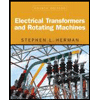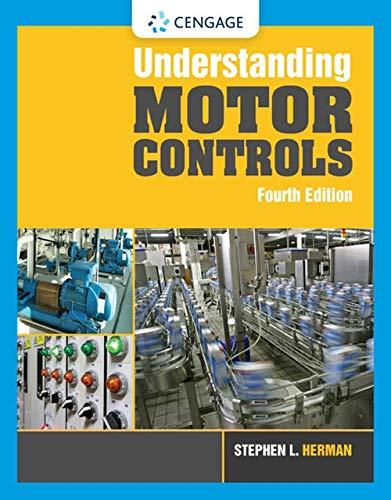
Electric Motors and Control Systems
2nd Edition
ISBN: 9780073373812
Author: Frank D. Petruzella
Publisher: McGraw-Hill Education
expand_more
expand_more
format_list_bulleted
Textbook Question
Chapter 3.2, Problem 1RQ
Define the terms primary and secondary as they apply to a transformer winding.
Expert Solution & Answer
Want to see the full answer?
Check out a sample textbook solution
Students have asked these similar questions
Oxygen (molar mass 32 kg/kmol) expands reversibly in a cylinder behind a piston at a constant pressure of 3 bar. The volume initially is 0.01 m3 and finally is 0.03 m3; the initial temperature is 17°C. Calculate the work input and the heat supplied during the expansion. Assume oxygen to be an ideal gas and take cp = 0.917 kJ/kg K. For 1 bonus mark explain why (using your understanding of thermodynamics) that oxygen is used in this context rather than water vapour.
Hydrodynamic Lubrication Theory
Q1: Convert this equations into Python by
1-
ah ap
a
h³ ap
1..ah
=
ax 12μ ax
ay
12μ ay
2 ax
Where P=P(x, y) is the oil film pressure.
2-
3μU (L²
ε sin
P=
C²R
(1+ cos 0)³
Q2: prove that
|h(0) = C(1+ cos 0)
?
### To make a conclusion for a report of an experiment on rockets, in which the openrocket software was used for the construction and modeling of two rockets: one one-stage and one two-stage.
First rocket (single-stage) reached a maximum vertical speed of 200 m/s and a maximum height of 1000 m
The second rocket (two-stage) reached a maximum vertical speed of 250 m/s and a maximum height of 1800 m
To make a simplified conclusion, taking into account the efficiency of the software in the study of rockets
Chapter 3 Solutions
Electric Motors and Control Systems
Ch. 3.1 - Prob. 1RQCh. 3.1 - a. If 1 MW of electric power is to be transmitted...Ch. 3.1 - Compare the type of AC power normally supplied to...Ch. 3.1 - a. Outline the basic function of a unit...Ch. 3.1 - list three factors taken into account in selecting...Ch. 3.1 - When motors and motor controllers are installed,...Ch. 3.1 - a. What types of conduit raceways are commonly...Ch. 3.1 - Compare the function of a switchboard, panelboard,...Ch. 3.2 - Define the terms primary and secondary as they...Ch. 3.2 - On what basis is a transformer classified as being...
Ch. 3.2 - Explain how the transfer of energy takes place in...Ch. 3.2 - In an ideal transformer, what is the relationship...Ch. 3.2 - A step-down transformer with a Wins ratio of 10:1...Ch. 3.2 - A step-up transformer has a primary current of 32...Ch. 3.2 - What is meant by the term transformer magnetizing,...Ch. 3.2 - Prob. 8RQCh. 3.2 - Prob. 9RQCh. 3.2 - Prob. 10RQCh. 3.2 - The primary of a transformer is rated for 480 V...Ch. 3.2 - A single-phase transformer is rated for 0.5 kVA, a...Ch. 3.3 - Explain the way in which the high-voltage and...Ch. 3.3 - Prob. 2RQCh. 3.3 - Prob. 3RQCh. 3.3 - Prob. 4RQCh. 3.3 - Prob. 5RQCh. 3.3 - Prob. 6RQCh. 3.3 - Prob. 7RQCh. 3.3 - Prob. 8RQCh. 3.3 - Explain the basic difference between the primary...Ch. 3.3 - Prob. 10RQCh. 3.3 - Prob. 11RQCh. 3.3 - Prob. 12RQCh. 3.3 - What important safety precaution should be...Ch. 3.3 - Prob. 14RQCh. 3.3 - The control transformer for an across-the-line...Ch. 3.3 - The two primary windings of a dual-primary control...Ch. 3.3 - Prob. 3TCh. 3.3 - A dry-type general-purpose power transformer is...Ch. 3.3 - A current transformer is to be tested in circuit...Ch. 3.3 - Discuss how electric power might be distributed...Ch. 3.3 - A block of several transformers arc fed from...Ch. 3.3 - How would you proceed with a DC resistance check...Ch. 3.3 - Prob. 5DT
Knowledge Booster
Learn more about
Need a deep-dive on the concept behind this application? Look no further. Learn more about this topic, mechanical-engineering and related others by exploring similar questions and additional content below.Similar questions
- What is the difference between saturated liquid and compressed liquid? What is the difference between the critical point and the triple pointarrow_forwardWhat is quality? Does it have any meaning in the superheated vapour region? What is the difference between saturated vapor and superheated vapour? What is the difference between saturated liquid and compressed liquid? What is the difference between the critical point and the triple point?arrow_forwardHomework#5arrow_forward
- Describe the principle operation of PEMFC, and role of membrane electrode assembly (MEA).arrow_forwardHomework#5arrow_forwardUsing graphical methods, draw the pressure angle at the position shown in (a) and (b). e |------- R = Cam Base Radius e = Follower Offset ẞ₁ = Section Duration 1 B₁ = Section Duration 2 ẞ₂ = Section Duration 3 В2 B₁ Follower Position ww R ẞ3 (a) Reference Radial (b)arrow_forward
- The figure below illustrates a graph that has a variable load torque and constant drive torque. Each cycle lasts three revolutions (6л radians). Torque (N-m) 600 550 400 1 200 TD= 225 N-m 2 + -T₁ 3 4 1 + 0 In addition, the rotation speed is @o steady-state conditions, determine 1. the average power required, 2πT 4π 5πT 6п Ꮎ = 180° rpm = 18.85 rad/sec, Imachine 125 kg-m². Assuming 2. the maximum and minimum rotational speeds throughout a cycle, 3. the mass of a 0.6-meter-diameter solid disc flywheel to produce Cs = 0.025.arrow_forwardAn elastic cord is stretched between 2 points A and B located 2y = 0.8 m apart in the horizontal plane. When stretched directly between A and B, the tension is P₂ = 40 N. The cord is then stretched as shown until its midpoint C has moved through x = 0.3 m to C', and a force of F = 240 N is required to hold the cord at C'. A pellet (m = 0.1 kg) is placed at C' and the cord is released. Find the speed of the pellet as it passes through C.arrow_forwardA 6305 ball bearing is subjected to a steady 5000-N radial load and a 2000-N thrust load and uses a very clean lubricant throughout its life. If the inner race angular velocity is 500rpm find (a) The equivalent radial load (b) The L10 life (c) The L50 lifearrow_forward
- Slove this the question plearrow_forwardDetermine the Mean Effective Pressure (MEP) in [bar] for a 4-cylinder, 2-Stroke engine with a bore of 85.7 mm, and a stroke of 65.8 mm, that produces 85 hP at 5000 rpm. (Hint: Be careful with units). Note: 1 hP = 0.7457 kW; 100 kPa = 1 bararrow_forwardIbraheem Super Q3: A boiler as shown in the figure below is producing 2 kg/s saturated steam at 240C. The water enters the boiler at 24C. The boiler efficiency is 80%. Patm=1.05 bar .Determine: (10 Marks) 1- The inlet pressure of the turbine. 2- If a gauge pressure connected to the outlet pipe, what is the reading of this gauge? 3- Calculate the required diesel in [kg/s]. Assume the calorific value of the diesel is 45000 kJ/kgf 4- Calculate the equivalent evaporation of the boiler 5- Keeping the same inlet conditions and fuel consumption, determine the turbine efficiency if the produced steam was saturated at 300C. Steam Cut Hot Gasses Out Ts=240C Boiler FURNACE A Water In C 24 Examiner Head of Department Ahmad. A. M. Alsak laniarrow_forward
arrow_back_ios
SEE MORE QUESTIONS
arrow_forward_ios
Recommended textbooks for you
 Electrical Transformers and Rotating MachinesMechanical EngineeringISBN:9781305494817Author:Stephen L. HermanPublisher:Cengage Learning
Electrical Transformers and Rotating MachinesMechanical EngineeringISBN:9781305494817Author:Stephen L. HermanPublisher:Cengage Learning Understanding Motor ControlsMechanical EngineeringISBN:9781337798686Author:Stephen L. HermanPublisher:Delmar Cengage Learning
Understanding Motor ControlsMechanical EngineeringISBN:9781337798686Author:Stephen L. HermanPublisher:Delmar Cengage Learning Refrigeration and Air Conditioning Technology (Mi...Mechanical EngineeringISBN:9781305578296Author:John Tomczyk, Eugene Silberstein, Bill Whitman, Bill JohnsonPublisher:Cengage Learning
Refrigeration and Air Conditioning Technology (Mi...Mechanical EngineeringISBN:9781305578296Author:John Tomczyk, Eugene Silberstein, Bill Whitman, Bill JohnsonPublisher:Cengage Learning

Electrical Transformers and Rotating Machines
Mechanical Engineering
ISBN:9781305494817
Author:Stephen L. Herman
Publisher:Cengage Learning

Understanding Motor Controls
Mechanical Engineering
ISBN:9781337798686
Author:Stephen L. Herman
Publisher:Delmar Cengage Learning

Refrigeration and Air Conditioning Technology (Mi...
Mechanical Engineering
ISBN:9781305578296
Author:John Tomczyk, Eugene Silberstein, Bill Whitman, Bill Johnson
Publisher:Cengage Learning
Power Plant Explained | Working Principles; Author: RealPars;https://www.youtube.com/watch?v=HGVDu1z5YQ8;License: Standard YouTube License, CC-BY